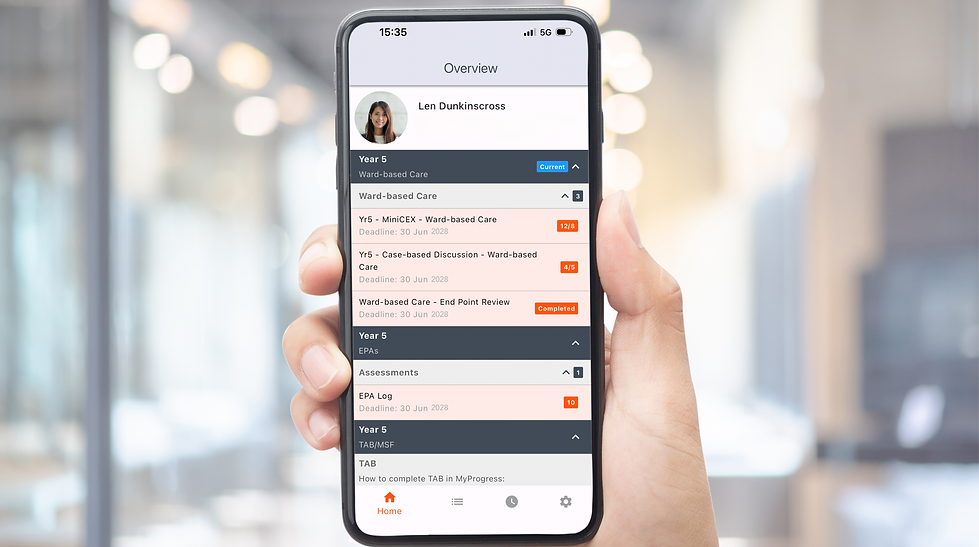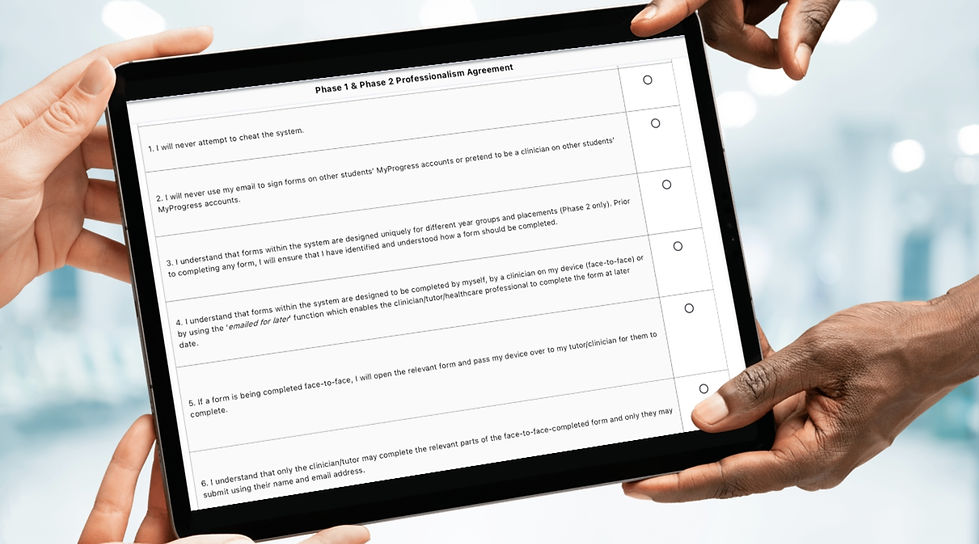University of Leicester’s Medical School:
MyProgress Case Study
Leicester Medical School, part of the University of Leicester, is renowned for its commitment to excellence in medical education. The school offers a forward-thinking curriculum designed to prepare students for the challenges of modern healthcare. With a strong emphasis on clinical skills, Leicester Medical School integrates cutting-edge technology into its teaching and assessment methods, ensuring graduates are well-equipped for their future roles in medicine.
Leicester Medical School has earned a distinguished reputation both nationally and internationally. It was ranked 5th in the UK among 33 medical schools in the 2020 Shanghai Ranking of World Universities and 20th globally in the same rankings.
Background
Before adopting MyProgress, Leicester Medical School relied on paper-based methods to assess student clinical skills. This approach presented significant challenges, particularly for administrative staff who had to manually transfer data from paper forms into Excel spreadsheets. The process was not only time-intensive but also delayed to the end of the academic year. Any issues, such as identifying at-risk students, were often discovered too late to implement effective interventions, potentially impacting student outcomes, student satisfaction, and attrition rates.
When evaluating digital portfolio solutions, Leicester Medical School identified two critical pain points:
1. Identifying At-Risk Students: The previous system lacked real-time visibility into student progress, making it difficult to provide timely support to those who were struggling.
2. Reducing Administrative Workloads: The paper-based system required extensive manual data entry and processing, consuming valuable time and resources.
Objectives for Implementing an ePortfolio
The primary goals for transitioning to a digital ePortfolio included:
1. Improving Visibility of Student Progress: Ensuring that faculty and administrators could track individual and cohort performance in real time.
2. Streamlining the Sign-Off Process for Clinical Skills: Simplifying the process of verifying and recording student competencies to ensure compliance with accreditation standards.
Timing and Context for the Transition
The decision to implement MyProgress benefited from existing broader technological advancements and a strategic push towards digital transformation within the medical school.

At the start of their programme, all students are provided with iPads, creating an ideal infrastructure for a digital ePortfolio system. Moving away from paper assessments to a platform that students could access on their devices whilst in practice was a logical step, aligning with institutional goals of modernising educational processes and leveraging technology to enhance learning.
Why MyProgress?
Leicester Medical School researched ePortfolio systems to see which would be a good fit to support medicine and did a comparison of the solutions available.
MyProgress was selected primarily as it could support other departments as well. MyProgress became the solution for Medicine, Nursing, Midwifery, and Physiotherapy, and most Healthcare departments, all at around the same time. And since then, additional healthcare departments have joined, i.e. Pharmacy.
Leicester Medical School selected MyProgress as their ePortfolio solution based on its ability to address their specific needs and deliver tangible benefits. Key reasons for choosing MyProgress included:
-
Configurable: MyProgress can be configured to support any discipline by allowing custom forms, workflows, and assessment criteria tailored to the specific requirements of different fields.
-
Streamlined Student Assessments: The platform offered an intuitive and efficient way to record and monitor student performance, significantly reducing administrative burdens.
-
Effortless Accreditation Compliance: MyProgress simplified the process of meeting accreditation requirements, ensuring that records were accurate and easily accessible.
-
Enhanced Visibility Over Progress: With real-time tracking capabilities, faculty could monitor individual and cohort progress, identifying trends and addressing issues proactively.
-
Support for At-Risk Students: The system provided actionable insights, enabling early identification of students in need of additional support and allowing timely interventions.
Implementation
Stakeholders involved in the implementation of MyProgress were Heads of Year, Phase 2 Clinical Director, Head of School, Head of Operations, Practice Software Coordinator, Educational Designer, College IT Team, and the Central Digital Services Team.
Training sessions were delivered by MyKnowledgeMap whilst initial forms were being built. Once a set of forms was ready to deploy, they were shared in online meetings with appropriate stakeholders and MyKnowledgeMap staff. Once the clinical skills forms required by the Medical School were rolled out, the Educational Designer - Terese Bird, and the Practice Software Coordinator began to meet online with different educational blocks in local hospitals, to create forms they would need. They would then create these forms, as well as any other needs arising in the School or in the various placement locations.
“For Medical students, we meet with the students in smaller chunks of year groups – Year 1 because it’s the very beginning, and Year 3 because it is the beginning of clinical years. We help them see the different views (browser and app), and the different ways of filling in the forms or passing device over for clinician to fill in forms. We usually record these sessions and distribute the videos over students’ VLE Blackboard.” Terese Bird, Educational Designer, Leicester Medical School.
As MyProgress was rolled out to other Healthcare departments at the University of Leicester, the MyKnowledgeMap team met with them online. Once forms were built and deployed to these departments, Terese Bird and her team began to meet with students to get them started using MyProgress. As time progresses, the department teaching and admin staff themselves have been able to offer more guidance to the students.
“For onboarding, we gather students details for each year group and upload into the system. For staff with university logins, they access via single-sign-on which was implemented by MyKnowledgeMap and our central IT. For clinical staff without university logins, we enter their details, email them, and they activate their accounts.”
“We join in meetings with clinical teachers and administrative staff, with medical school staff, and with healthcare staff, so as to keep up discussion on the system, and if there are any requested changes. Often, it is over time we realise a change is needed. For example, in Medicine, we are about to implement more of a pass-fail marking system for clinical skills, rather than a more graduated system as before.”
“To date, MyProgress has a single-sign-on system with the University of Leicester’s login system. We hope to soon acquire a placement admin system which we hope will integrate with MyProgress.”
Usage
The way the MyProgress ePortfolio is used varies greatly according to the user’s role.
Faculty
Leicester Medical School empowers staff with the flexibility to design and customise assessment forms to meet their specific requirements. Once finalised, these digital assessments are seamlessly distributed to students. Clinical skills are assessed directly in practice, with the resulting assessments and feedback securely captured in each student’s ePortfolio. Faculty members benefit from a comprehensive analytics dashboard, enabling them to monitor the progress of individual students or entire cohorts at a glance, facilitating data-driven decisions to support student success. At risk students are easy to identify, and targeted support can be provided in a timely manner.

Practice Staff
Practice staff have a MyProgress account, providing a secure and efficient way to assess students.

Through MyProgress, practice staff can access the portfolios of all linked students and easily monitor their progress. Additionally, the platform's speech-to-text functionality allows assessors to provide immediate, detailed feedback in the heat of the moment, ensuring timely and accurate reflections on student performance.

Students
Students can access their complete portfolio through a web browser, where their entire programme is digitally organised. This includes all required assessments, systematically arranged by year, rotations, and specialties within each year.
The mobile app offers a streamlined version of the portfolio, focusing on the assessments relevant to the student’s current rotation. Designed for convenience, the app functions offline, ensuring seamless access and usability even in areas with unreliable internet connectivity.

One of the interesting ways in which Leicester Medical School uses MyProgress is to help ensure medical students learn professionalism and keep integrity, which could not previously be done with paper books.
.jpg)
Besides forms, some of the key features of MyProgress that are actively used include reflection logs and showcase portfolios. Leicester Medical School employ a different online assessment tool for written assessments at the end of the year and end of block, and these marks are transferred over to MyProgress so that students can have everything in one place. Showcases, where students can save evidence of learning, are an area of MyProgress that the School hopes to use more going forward.
The adoption rate of MyProgress at the University of Leicester is 100% as every student in Medicine, Midwifery, Nursing, Physiotherapy, Radiography, and Pharmacy uses the ePortfolio, as it is a required tool in their programmes.
User Feedback
“Students have expressed appreciation for the fact that their assessment feedback is all in one place and they cannot lose it, as they could have lost their paper books. Administrative staff comment “It’s fantastic. It’s much better than the books. All we need to do is log in, type in the student’s name, and we can see how they’re doing.” Another administrator said, “It saves so much time, it's instant information. So, if someone says 'How's this person getting along?' I can tell them in seconds. I can pull up the data. Massively saves time... it saves weeks. But also, for the students - they would have to come in with the books and pick them up again. Now we are able to react quickly to student information. When people are monitoring students and need information for meetings, we can so quickly answer their request. Within half a day we can check a whole year group's information. (Note Leicester Med School has approximately 300 students per year.) Now we can just run the reports and it's so much quicker.” Terese Bird.
Impact and Benefits
Since adopting MyProgress, Leicester Medical School has seen a transformative impact on both staff workflows and student outcomes. Administrative workloads have been significantly reduced, allowing staff to focus on more strategic tasks. Students benefit from increased transparency regarding their progress, fostering a more supportive and responsive learning environment. Additionally, the ability to identify and support at-risk students early has contributed to improved overall performance and satisfaction.
An unexpected benefit of implementing MyProgress has been its positive impact on professionalism and integrity within the assessment process. The system provides an automatic email trail, creating a transparent record of who signed off each clinical skill. This functionality has effectively addressed issues of fraudulent assessments, which had occasionally occurred with the paper-based system. Previously, it was challenging to verify signatures or confirm the authenticity of skill signoffs.
With MyProgress, students can ask clinicians with no account to sign them off using the clinician’s email address; then the clinician receives a confirmation email. If the clinician receives a confirmation email but did not observe the student, the university investigates to get to the bottom of it. This workflow can be configured in different ways to accommodate each HEI, at Leicester Medical School, as there are hundreds of clinical staff who may sign off students, but who are not part of the university, it would be too hard to manage all of those accounts, so this was the preferred workflow.
This added layer of accountability has not only eliminated the problem of fraudulent signoffs but also strengthened trust between students and faculty, ensuring the assessment process is fair, transparent, and reliable.
By embracing MyProgress, Leicester Medical School has not only modernised its assessment processes but also enhanced its capacity to deliver high-quality medical education in a rapidly evolving digital landscape.
In terms of the biggest impact or benefit from using MyProgress, the administrative time saving has been the most significant at Leicester Medical School. As time progresses and more and more students use the system, we hope to see improvements in educational outcomes too.
MyProgress’ intuitive interface is what delighted users the most, as it meant it wasn’t hard for new users to start using. Best of all, is the fact that neither the university nor students can lose the data.

“We can run and share reports of entire year cohorts in just several hours. Gathering such data before would have taken at least some days. We can also see how students are doing, anytime” Terese Bird, Educational Designer, Leicester Medical School.
Challenges
During the implementation and use phases, we encountered some challenges that provided valuable learning opportunities. Initially, assigning different permission levels to stakeholders for student data was a hurdle, causing a slight delay in the launch. However, this issue has now been fully resolved. Additionally, the team initially lacked permissions to create or modify forms in MyProgress. Once these permissions were granted, they were able to efficiently address most issues as they arose, ensuring a smoother process moving forward.
User adoption was one of the challenges that faced the initial rollout. At first, some staff did not want to use the new system, preferring to increase use of the previous system (paper books plus a different ePortfolio with fewer features). But now everyone can see that MyProgress has the features needed and is moving forward all the time.
Lessons Learned
Through the selection, implementation, and use of MyProgress, Terese Bird and the team at Leicester Medical School gained several important insights:
· Choosing a product that functions without WiFi, such as the MyProgress app, is essential, as students will be working in diverse environments with unpredictable connectivity.
· Introducing the platform in large lecture settings is not effective; instead, smaller, hands-on sessions allow students to engage with the system, ask questions, and build confidence.
· Involving teaching and administrative staff from various healthcare departments early on ensures that students understand how MyProgress integrates into their training, rather than perceiving it as just another IT tool.
Terese Bird also recommends having a member of university staff onsite to build and tweak forms as needed.
Conclusion
The implementation of MyProgress at Leicester Medical School has significantly transformed the way student clinical assessments are conducted. By replacing a time-consuming paper-based system with a streamlined digital platform, the Medical School has improved efficiency, reduced administrative burdens, and enhanced visibility into student progress. Faculty, students, and practice staff have all benefited from the real-time accessibility, ease of use, and ability to track assessments in a structured, reliable manner.
MyProgress has contributed to a more supportive learning environment by enabling early identification of at-risk students, facilitating timely interventions, and promoting professionalism through transparent assessment processes. The system’s adaptability has also allowed its adoption across multiple healthcare disciplines at the University of Leicester, ensuring a unified and scalable approach to ePortfolios.
While initial challenges such as user adoption and technical limitations required strategic solutions, the long-term benefits of MyProgress have far outweighed these hurdles. Lessons learned from this experience highlight the importance of early stakeholder involvement, hands-on training, and a system that functions both online and offline to accommodate diverse clinical settings.
Looking ahead, Leicester Medical School continues to refine its use of MyProgress, and the ePortfolio is now being rolled out to additional disciplines at the University of Leicester, including Diagnostic Radiography and Pharmacy, demonstrating its adaptability across a wide array of academic programmes.
This case study demonstrates how digital transformation, when carefully planned and executed, can elevate medical education and support the development of highly competent future healthcare professionals.
Contact us to discover how MyProgress can be configured to support your programme's requirements in demo.
